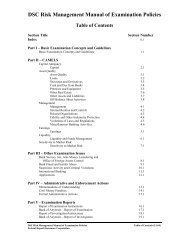FDIC Supervisory Insights Summer 2009
FDIC Supervisory Insights Summer 2009
FDIC Supervisory Insights Summer 2009
Create successful ePaper yourself
Turn your PDF publications into a flip-book with our unique Google optimized e-Paper software.
From the Examiner’s Desk<br />
continued from pg. 29<br />
Compliance Practitioner Note:<br />
With respect to the requirement to verify<br />
or document income or assets, the Federal<br />
Reserve has created a safe harbor for a<br />
mortgage lender that does not verify or document<br />
income or assets used to determine<br />
repayment ability. Under the safe harbor, a<br />
mortgage lender does not violate Regulation<br />
Z if it demonstrates that the stated income<br />
or assets it relied upon were not materially<br />
greater than the amounts it could have<br />
verified. For example, if a mortgage lender<br />
determines a consumer’s repayment ability<br />
by relying on the consumer’s stated annual<br />
income of $100,000, but fails to obtain reliable<br />
third-party documentation verifying that<br />
amount before consummating a higher-priced<br />
mortgage loan, the mortgage lender will not<br />
have violated Regulation Z if it later obtains<br />
reliable evidence that would satisfy Regulation<br />
Z’s verification requirement. Such evidence<br />
might be a W-2 or tax return information<br />
showing that the mortgage lender could have<br />
documented, at the time the higher-priced<br />
mortgage loan was consummated, that the<br />
consumer had an annual income not materially<br />
less than $100,000. However, <strong>FDIC</strong>-super-<br />
Imposing a prepayment penalty<br />
after two years or imposing a<br />
prepayment penalty at any time<br />
under certain circumstances 19<br />
A mortgage lender is prohibited from<br />
imposing a prepayment penalty on a<br />
higher-priced mortgage loan after the<br />
first two years. In addition, a mortgage<br />
lender is prohibited from imposing a<br />
prepayment penalty at any time during<br />
the term of a higher-priced mortgage<br />
loan if<br />
– Other applicable law (e.g., state law)<br />
prohibits such penalty. 20<br />
vised institutions engaging in mortgage loan<br />
underwriting practices that base extensions of<br />
mortgage credit on consumers’ stated income<br />
(without verification through reliable thirdparty<br />
documentation) will be carefully evaluated<br />
on a case-by-case basis to determine<br />
whether such practices raise (1) safety and<br />
soundness concerns, particularly if seen on a<br />
portfolio-wide basis; or (2) consumer protection<br />
concerns under section 5 of the Federal<br />
Trade Commission (FTC) Act (Unfair or Deceptive<br />
Acts or Practices) or other consumer<br />
protection laws or <strong>FDIC</strong> guidance. 18<br />
– The consumer’s mortgage payment<br />
(i.e., payment of principal or interest or<br />
both) can change during the first four<br />
years of the loan term. For example,<br />
the imposition of a prepayment penalty<br />
on a higher-priced adjustable-rate<br />
mortgage that resets every five years<br />
would be permissible. However, if the<br />
loan contract in this example permits<br />
negative amortization and the right of<br />
the mortgage lender to accelerate the<br />
payment reset date, for instance, when<br />
the loan balance reaches a contractually<br />
set threshold caused by the negative<br />
amortization within the first four years<br />
18 For example, see <strong>FDIC</strong>’s <strong>Supervisory</strong> Policy Statement on Predatory Lending,<br />
http://www.fdic.gov/news/news/financial/2007/fil07006a.html. “Predatory lending involves … making unaffordable<br />
loans based on the assets of the borrower rather than on the borrower’s ability to repay an obligation.” In<br />
its comment letter to the Federal Reserve on the 2008 Regulation Z amendments, the <strong>FDIC</strong> expressed its belief<br />
that the Federal Reserve should eliminate the safe harbor and stand firm in requiring lenders to adequately verify<br />
borrowers’ income and assets. Specifically, the <strong>FDIC</strong> wrote, “Verifying a borrower’s income and assets is a<br />
fundamental principle of sound mortgage loan underwriting that protects borrowers, neighborhoods, investors,<br />
and the financial system as a whole.… Requiring borrowers to document their income will make it far less likely<br />
that consumers will receive loans that they cannot afford to pay. Documentation also will provide the markets<br />
with greater confidence in the quality of pools of higher-priced (and nontraditional) mortgage loans and their<br />
projected income streams. Thus, both consumers and the economy as a whole will benefit.”<br />
See http://www.federalreserve.gov/SECRS/2008/April/20080409/R-1305/R-1305_1075_1.pdf.<br />
19 These prepayment penalty prohibitions are equally applicable to “high-cost mortgages” under sections<br />
226.32 and 226.34. Note: Under Regulation Z, 12 CFR 226.23(a)(3), footnote 48, a high-cost mortgage loan having a<br />
prepayment penalty that does not conform to the requirements of section 226.32(d)(7) is subject to a three-year<br />
right of the consumer to rescind. The FRB is revising footnote 48 to clarify that a higher priced mortgage loan<br />
(whether or not it is a HOEPA loan) having a prepayment penalty that does not conform to the requirements of<br />
section 226.35(b)(2) also is subject to a three-year right of rescission.<br />
20 <strong>FDIC</strong>-supervised institutions may not impose prepayment penalties on any consumer mortgage, even if it is not<br />
higher-priced or high-cost under Regulation Z, if other applicable law prohibits such penalties.<br />
30 <strong>Supervisory</strong> <strong>Insights</strong> <strong>Summer</strong> <strong>2009</strong>

















